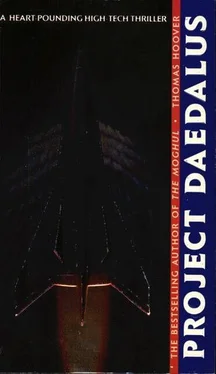Thomas Hoover - Project Daedalus
Здесь есть возможность читать онлайн «Thomas Hoover - Project Daedalus» весь текст электронной книги совершенно бесплатно (целиком полную версию без сокращений). В некоторых случаях можно слушать аудио, скачать через торрент в формате fb2 и присутствует краткое содержание. Жанр: Триллер, на английском языке. Описание произведения, (предисловие) а так же отзывы посетителей доступны на портале библиотеки ЛибКат.
- Название:Project Daedalus
- Автор:
- Жанр:
- Год:неизвестен
- ISBN:нет данных
- Рейтинг книги:5 / 5. Голосов: 1
-
Избранное:Добавить в избранное
- Отзывы:
-
Ваша оценка:
- 100
- 1
- 2
- 3
- 4
- 5
Project Daedalus: краткое содержание, описание и аннотация
Предлагаем к чтению аннотацию, описание, краткое содержание или предисловие (зависит от того, что написал сам автор книги «Project Daedalus»). Если вы не нашли необходимую информацию о книге — напишите в комментариях, мы постараемся отыскать её.
Project Daedalus — читать онлайн бесплатно полную книгу (весь текст) целиком
Ниже представлен текст книги, разбитый по страницам. Система сохранения места последней прочитанной страницы, позволяет с удобством читать онлайн бесплатно книгу «Project Daedalus», без необходимости каждый раз заново искать на чём Вы остановились. Поставьте закладку, и сможете в любой момент перейти на страницу, на которой закончили чтение.
Интервал:
Закладка:
"As you wish," Ikeda replied evenly, taking his first sip of coffee.
In truth, Andrei Androv did not dismiss simulations out of hand. He knew their Fujitsu supercomputer was truly a marvel, capable of replicating the aerodynamic characteristics of a given fuselage component, modifying it, testing it, over and over millions of times, iterating to the optimum design in almost the twinkling of an eye.
In every respect the high technology available here was astonishing. Take their hypersonic wind tunnel. Its laser probes shone thin slices of coherent light through the swirling air currents, revealing complexities otherwise hidden amid whorls of turbulence. These data were then enhanced through holography, which used the laser light to create colored 3-D representations of the flow around the model. Finally those holograms were fed into the supercomputer and analyzed from all angles.
This project would have been impossible anywhere else on earth. But here, the foreign team had created a feather-light hypersonic airframe that used turbo-ramjets for horizontal takeoff and then changed their geometry into fuel-injected supersonic combustion ramjets, or scramjets, which combusted fuel and atmospheric oxygen using an internal shock wave instead of conventional compressors to achieve orbital velocity, Mach 25. It was his dream come true.
"Brief me again on the simulation." Androv turned back to Ikeda. "You say you went all the way to our maximum design objective?"
"We ran through the entire flight profile in real time," the other man replied. "There were no stability problems whatsoever. Either during the power-up or during the switch-over to scramjet engine geometry at Mach 4.8."
"Encouraging, encouraging." Androv turned back to his video panel as the fans continued to accelerate. The violins of the A Minor quartet, his favorite of all Beethoven's late works, washed over the room. "All the same, we must run a complete sequence here for any design alterations."
He then fell silent, studying the screens. Mach 25. That was-yes-almost seventeen thousand miles per hour. A velocity greater than any existing missile. And it was air-breathing!
Their supercomputer's revolutionary aerodynamic design had made it possible. Problem: at velocities higher than Mach 5 unprecedented airflows were required, due to heat buildup in the fuel-injection struts and the shortage of oxygen at rarified altitudes. Solution: the entire underside of the vehicle had been shaped to serve as an extension of the intakes for the twelve massive scramjets. The fuselage of the plane itself was going to act as a giant funnel, scooping in air. And it had appeared to work, at least in the computer. Then finally the Japanese engineers had perfected the liquid-air-cycle process, permitting the cryogenic hydrogen fuel to be used to liquefy a portion of the incoming air and inject it under high pressure into the engine. The final, essential breakthrough.
Andrei Androv was both an idealist and a pragmatist. In Russia you had to be. That education began almost half a century earlier when, as a student, he had been on hand to assist in the first free flight of a Russian-made liquid fuel rocket, at an army base just outside Moscow. He had experienced the exhilaration of a new frontier, and plunging himself into the new science of rocketry, he had become a self-taught expert who published theoretical works read and praised by men three times his age.
Ironically, therefore, Andrei Petrovich Androv had not enjoyed the luxury of being ignored, as the American rocket pioneer Goddard had been. Joseph Stalin, always paranoid, decided that the rocket researchers' "fireworks" were "dangerous to the country." Consequently, Andrei Petrovich Androv was arrested, interrogated at Butyrskaya Prison in Moscow, and dispatched on the Trans-Siberian Railroad to a convict coal mine on the Pacific coast.
Eventually the political winds shifted. As a recognized rocket expert, he was part of the 1946 Soviet team that shipped German scientists and V-2 launchers back to Russia. Finally, under Khrushchev, he rose to genuine prominence, since that general secretary believed that only rockets, not manned aircraft, had the range to drop bombs on the U.S. Nikita S. Khrushchev put Andrei Androv in charge of all Soviet rocketry, and Andrei Androv put Russia in space.
He'd been in charge of constructing the sprawling Baikonur Cosmodrome, near Tyuratram in Kazakhstan, central Asia, still the world's largest space center. From it he orbited the world's first satellite, Sputnik, and the world's first astronaut, Yuri Gagarin. He knew the byways of that top-secret facility almost better than he knew his own living room-the gantry systems, the fueling apparatus, the clean rooms, the rocket assembly areas, the sectors where satellites were readied. Most recently, in 1987, he had been in charge of the successful first test launch of the most powerful vehicle the world had ever seen-the Energia, propelled by liquid hydrogen engines capable of lifting a hundred-ton space platform into orbit.
Also during that time his only son, Yuri Andreevich, had become the Soviet Union's leading test pilot. Yuri was rarely home, and then, nine years ago, Andrei Androv's wife had died of pneumonia. Isolated in the long, snowy nights at Baikonur, he'd consoled himself with string quartets, his studies of classical Greek, and his designs, his dreams of the ultimate space vehicle.
But he knew Russia would never be able to build it alone. Soviet computer and materials technology already was slipping behind those of the West.
He grimaced to think how his country had been brought to today's humiliating state of affairs, reduced to bargaining with foreigners like Arabs in a medina. Eventually, though, pragmatism had overruled all. Underlying this bizarre new alliance was one simple reality: the USSR needed Japanese high technology desperately. And it needed that technology now.
It had begun two years earlier, when the president himself had paid a surprise secret visit to the space complex at Baikonur, supposedly to review the Energia launch schedule. That, however, was merely the official excuse. He actually had an entirely different agenda.
Without saying why, he had invited his old friend Andrei Petrovich Androv to join him at the secluded hunting lodge where he was staying-to talk, one-on-one, about the future of Soviet science. As that long snowy evening wore on, wind whistling through the log walls and pine smoke clouding the air, their conversation had turned to hard truths and blunt language.
In vino, Veritas. By midnight, the uniformed bodyguards outside were stamping their heavy boots to keep warm, and Andrei Petrovich and Mikhail Sergeevich were both drinking vodka directly from the bottle, had flung its tinfoil cap onto the rough-hewn boards of the cabin's floor. By then, too, the revered Andrei Petrovich Androv was boldly speaking his mind.
"Mikhail Sergeevich, time has run out for Russia. There is nothing to buy, almost nothing to eat, and prices are soaring. There is so much corruption you will not leave a Russian hospital alive unless you've bribed everyone, right down to the drunken orderlies. And those bribes can't be money. Who wants rubles? They are worthless. These days you have to bribe with vodka." He'd laughed sadly, then picked up an old copy of Pravda there by the fireplace, waved it in the air, and tossed it into the crackling flames. "When we start cooperatives, they are immediately taken over by our new mafia, Russia's ruble millionaires. Everything-"
"Perestroika will succeed in time, Andrei Petrovich," the president had insisted perfunctorily, still not having explained why they were meeting. "We are moving as rapidly as circumstances will permit. The bureaucracy-"
"Perestroika!" Androv had roared back. "Have you heard the latest joke from Moscow? Perestroika is like a country where everyone is switching from driving on the left side to the right side-gradually. Our half-measure concessions to a market economy have produced the worst of both systems. We now have a land with socialist initiative and capitalist conscience." He paused to laugh again, then sobered. "And soon, very soon, we're going to find ourselves in the technological Third World. We need a vision. Even more, we need hard currency, and Western technology now. And we need massive amounts. Nothing less can save us."
Читать дальшеИнтервал:
Закладка:
Похожие книги на «Project Daedalus»
Представляем Вашему вниманию похожие книги на «Project Daedalus» списком для выбора. Мы отобрали схожую по названию и смыслу литературу в надежде предоставить читателям больше вариантов отыскать новые, интересные, ещё непрочитанные произведения.
Обсуждение, отзывы о книге «Project Daedalus» и просто собственные мнения читателей. Оставьте ваши комментарии, напишите, что Вы думаете о произведении, его смысле или главных героях. Укажите что конкретно понравилось, а что нет, и почему Вы так считаете.












